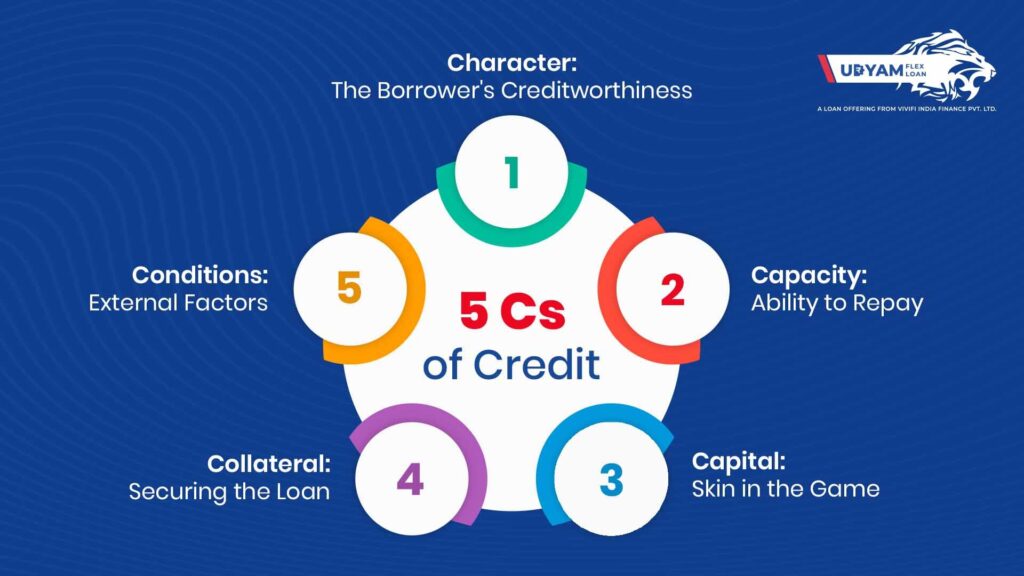Understand the 5 Cs of Credit to Secure Your Business Loan

The 5 Cs of Credit – Character, Capacity, Capital, Collateral, and Conditions – form the bedrock of credit assessment in the financial world. As of 2024, with India’s digital lending platforms processing over 60% of personal loans, understanding these principles has become more crucial than ever. Let’s explore each component’s significance in the modern lending landscape.
Understanding the 5 Cs of Credit
1. Character: The Borrower’s Creditworthiness: Character, in financial terms, refers to the borrower’s reputation and track record in managing credit. It’s a measure of reliability and integrity in financial dealings besides when you apply for business loans. To check this, the lenders evaluate the credit history, payment behaviour and length of credit history. A good character increases loan approval chances whereas late payments can lower credit scores by 50-100 points. It also affects your future borrowing capacity.
2. Capacity: Ability to Repay: When you are applying for Business loans or other loans, the Capacity evaluates the borrower’s ability to repay the loan based on income and existing financial obligations. Your Debt-to-Income Ratio, employment Stability and income Level indicate greater repayment capacity. It is so significant that a 5% reduction in DTI can increase loan approval odds by 25%.
3. Capital: Skin in the Game: In the 5 Cs of Credit, Capital refers to the borrower’s investment or down payment in the financed asset, indicating a commitment to the transaction. Larger down payments often secure better loan terms. Whereas savings and Assets Demonstrate financial stability and backup resources. Also, lenders are increasingly considering alternative forms of capital such as cryptocurrency holdings.
4. Collateral: Securing the Loan: Collateral provides security to the lender in case of default, reducing the risk associated with the Business Loan. Real Estate mortgage is the most common for large loans. While vehicles are often used for auto loans. Investments, such as Stocks, bonds, or other financial assets and inventory and Equipment are considered for business loans. Gold and digital assets including NFTs, are being accepted as collateral by fintech lenders.
5. Conditions: External Factors: While understanding the 5 Cs of Credit, the conditions also encompass the purpose of the loan. It also talks about external economic factors that may affect the borrower’s ability to repay. Lenders assess the purpose of the loan and how the loan will be used. Overall economic conditions influence lending decisions while the industry trends talk about the health of the relevant industry. For example, loans for sustainable and green initiatives receive preferential rates, with interest rates lower than standard loans. The RBI’s regulatory sandbox for fintech has led to an increase in innovative lending products tailored to specific economic conditions.
How to Enhance Each of the 5 C’s of Credit
- Boost Your Savings: Increasing your savings not only enhances your financial stability but also improves your capital on paper. It shows lenders that you have the means to repay your Business loan. Having more savings can help you make a larger down payment, which is a favourable condition.
- Pay Bills Consistently and On Time: Your payment history is the most significant factor in your credit score. Making timely payments can gradually improve your credit score and demonstrate your reliability to lenders when you Apply for a Business Loan.
- Pay Down Debts Early: The amount you owe makes up 30% of your credit score. By making extra payments or paying off debts ahead of schedule, you can improve your credit score. It enhances your capacity to repay future loans and reduces the perceived risk for lenders.
- Avoid Opening New Credit Accounts: Opening multiple credit accounts in a short span can signal risk to lenders. To improve your credit profile, limit new applications for a Business Loan. It also reflects positively on your financial character and debt management capacity.
- Request a Credit Limit Increase: Your credit utilization rate can also improve your 5 Cs of Credit. It compares your outstanding debt to your total credit limit, is an important factor in credit scoring. Keeping this ratio below 30% is ideal. To improve it, consider asking for a credit limit increase, but be careful not to increase your spending, as that could negate the benefit.
Udyam Flex Loan
The Udyam Flex Loan represents an innovative approach to MSME financing in India, particularly in its application of the 5 Cs of Credit. To assess the character and credibility of borrowers it reads the digital footprint of a business with verified information. It reduces reliance on traditional credit histories.
With minimal equity and business-age requirements, this loan is making it easier for MSMEs to access substantial capital. Also, it demands no collateral, addressing a major pain point when applying for business loans. The loan terms are tailored to specific industry conditions and business cycles. We offers customized repayment structures for industries like agriculture, manufacturing, and services. By reimagining the application of the 5 Cs, Our Loan has significantly improved credit access for MSMEs.
Also read – How MSME can Benefit Startup
Understanding and optimizing these five aspects of creditworthiness is crucial for borrowers applying for a business loan to secure favourable loan terms. For lenders, balancing these factors helps in making sound lending decisions. It also helps in maintaining a healthy loan portfolio. This leads to contributing to overall financial stability. As the financial ecosystem continues to evolve, the interpretation and application of the 5 Cs of Credit will undoubtedly adapt, but their core
principles are likely to remain relevant in assessing creditworthiness for years to come.

